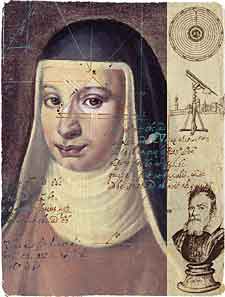Main Menu · Search · Current Issue · Contact · Archives · Centennial · Letters to the Editor · FAQs
 
This unsigned, undated, untitled painting, which disappeared from a small museum in Arcetri soon after it was photographed, is generally thought to portray Suor Maria Celeste. |
Galileo Galilei, famously the father of modern physics, also fathered three children during a 12-year love affair with the mysterious Marina Gamba. When he ended their liaison in 1610 by leaving Venice to become chief mathematician and philosopher at the Medici court in Florence, he took with him his two daughters, Virginia and Livia, ages 10 and nine, whom he had christened after his sisters, while four-year-old Vincenzio, named for Galileo's father, stayed temporarily under Marina's care.
Realistically appraising his daughters' future prospects, Galileo placed them at the Convent of San Matteo in Arcetri, a mile from Florence, shortly after Virginia's thirteenth birthday. As each girl reached the canonical age of 16, she professed her vows of poverty, chastity, and obedience in the Franciscan order of the Poor Clares. Virginia took the name Maria Celeste, in a gesture that acknowledged her father's fascination with the stars. She remained devoted to Galileo for the rest of her life, and he grew emotionally dependent upon this "woman of exquisite mind," as he called her, "singular goodness, and most tenderly attached to me."
From their intimate correspondence, 124 of her letters survive.
I set aside and save all the letters that you write me daily, Sire, and whenever I find myself free, then with the greatest pleasure I reread them yet again, so that I abandon myself to thoughts of you....
Suor Maria Celeste's letters chronicle momentous events of Galileo's career, including the writing of his Dialogue on the Two Chief Systems of the World and his trial and conviction by the Holy office of the Roman Inquisition. Her letters speak from inside a convent where residents often took the veil as a "forced vocation" instead of a true calling; she witnessed one nun's repeated suicide attempts, and suffered abuses from unscrupulous priests.
Musically talented, Suor Maria Celeste directed the nuns' choir and taught novices Gregorian chant. As convent apothecary, she fabricated pills and tonics from rose water, aloe, and rue--not only for the sick sisters, but also to treat Galileo's frequent ills.
Truly I never take notice of living cloistered as a nun, except when I hear that you are sick, Sire, because then I would like to be free to come to visit and care for you with all the diligence I could muster.
She coddled her younger sister, Suor Arcangela, whose melancholy, eccentric personality engendered a host of hysterical complaints. Her own health was indifferent at best, and toothaches forced her to extract her own rotted molars.
I have been confined to bed since Sunday with a fever.... Now that blessed God has seen fit to keep me alive, Sire, I am ...appealing to you in my neediness, confident that day after day you will minister to me with your gracious loving tenderness....I will say only that the provisions currently given to us in the convent consist of moldy bread, ox meat, and wine that has turned sour....
She ministered to her father and brother by laundering their collars, mending Galileo's worn leather work apron, copying his important letters in her fine hand. A chance remark suggests she also wrote out the (missing) final manuscript for Galileo's Dialogue, which was banned soon after its 1632 publication--and then spent two centuries on the Index Librorum Prohibitorum.
All through the year of her father's trial in Rome and detention at Siena, Suor Maria Celeste oversaw his domestic affairs from within her convent walls. As keeper of Galileo's keys, she aided friends who removed incriminating evidence from his villa.
Every hour seems a thousand years to me while I await that promised day when I shall see you again....At no time do I ever leave off commending you with all my soul to blessed God, because you fill my heart, Sire, and nothing matters more to me than your spiritual and physical well-being. And to give you some tangible proof of this concern, I tell you that I succeeded in obtaining permission to view your sentence, the reading of which, though on the one hand it grieved me wretchedly, on the other it thrilled me to have seen it and found in it a means of being able to do you good, Sire, in some very small way; that is by taking upon myself your obligation to recite once each week the seven psalms, and I have already begun to fulfill this requirement and to do so with great relish, first because I believe that prayer accompanied by the claim of obedience to Holy Church is effective, and then, too, to relieve you of this care. Therefore if I were able to substitute myself in the rest of your punishment, most willingly would I elect a prison even straiter than this one in which I dwell, if by so doing I could set you at liberty.
Soon after Galileo returned, the strain of his daughter's anxious vigil took its toll. Her death on April 2, 1634, officially laid to dysentery, more likely reflected the cumulative effects of exposure, malnutrition, and a broken heart.